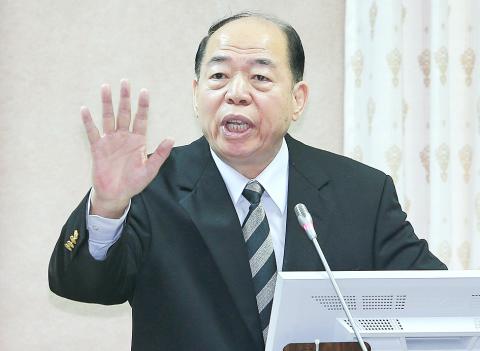The nation’s high-tech sector is under serious threat of industrial espionage as Chinese intelligence operatives target local companies for infiltration and collection of proprietary information, National Security Bureau (NSB) Director-General Yang Kuo-chiang (楊國強) told legislators yesterday.
Yang made the remarks during a question-and-answer session at a meeting of the legislature’s Foreign Affairs and National Defense Committee meeting.
New Power Party Legislator Freddy Lim (林昶佐) said he has grave concerns over Chinese espionage operations, because there have been numerous cases involving Chinese spies luring members of the nation’s armed forces into leaking classified military information.

Photo: CNA
“In addition to our military, which Taiwanese industries have been most seriously affected by Chinese spy infiltration?” Lim asked. “I would like to know, because I want these businesses to be alert to this danger so they can be more careful when hiring new workers.”
Yang said that the semiconductor and other tech sectors are the most likely targets.
Lim said that these sectors are key to the nation’s economy, and “yet President Ma Ying-jeou (馬英九) wants to open up the nation’s technology sector for investment by Chinese business. This is just absurd.”
Democratic Progressive Party (DPP) Legislator Wang Ting-yu (王定宇) said that Yang and the bureau should block bids by Chinese investors and companies to buy out Taiwanese tech businesses.
Wang was referring to the Investment Commission, which is tasked with the review, assessment and monitoring of foreign investment, and where the bureau has a representative seat.
He said the semiconductor sector is a pillar of the nation’s economy and the bureau should veto investment applications from China.
“Taiwan is a leader in IC design and we must not allow know-how and proprietary technology to be taken over by China. It is well-known that most large Chinese businesses are backed by financial capital from the Chinese government,” Wang said.
“So this is a national security issue and a serious threat to Taiwan’s economic development. Therefore, the NSB must not permit Chinese investment in the IC sector,” he added.
DPP Legislator Chiu Chih-wei (邱志偉) also asked Yang about the potential impact on cross-strait ties if China is not satisfied with president-elect Tsai Ing-wen’s (蔡英文) inauguration speech on May 20.
Yang said Beijing might shut down existing negotiation channels, prohibit Chinese tourists from visiting Taiwan, or take diplomatic action if it is unhappy with Tsai’s speech, Yang said.
The president would have to work with other senior government officials to make a response should China take any of the above three actions against Taiwan, Yang said.
Additional reporting by CNA

INVESTIGATION: The case is the latest instance of a DPP figure being implicated in an espionage network accused of allegedly leaking information to Chinese intelligence Democratic Progressive Party (DPP) member Ho Jen-chieh (何仁傑) was detained and held incommunicado yesterday on suspicion of spying for China during his tenure as assistant to then-minister of foreign affairs Joseph Wu (吳釗燮). The Taipei District Prosecutors’ Office said Ho was implicated during its investigation into alleged spying activities by former Presidential Office consultant Wu Shang-yu (吳尚雨). Prosecutors said there is reason to believe Ho breached the National Security Act (國家安全法) by leaking classified Ministry of Foreign Affairs information to Chinese intelligence. Following interrogation, prosecutors petitioned the Taipei District Court to detain Ho, citing concerns over potential collusion or tampering of evidence. The

‘FORM OF PROTEST’: The German Institute Taipei said it was ‘shocked’ to see Nazi symbolism used in connection with political aims as it condemned the incident Sung Chien-liang (宋建樑), who led efforts to recall Democratic Progressive Party (DPP) Legislator Lee Kun-cheng (李坤城), was released on bail of NT$80,000 yesterday amid an outcry over a Nazi armband he wore to questioning the night before. Sung arrived at the New Taipei City District Prosecutors’ Office for questioning in a recall petition forgery case on Tuesday night wearing a red armband bearing a swastika, carrying a copy of Adolf Hitler’s Mein Kampf and giving a Nazi salute. Sung left the building at 1:15am without the armband and apparently covering the book with a coat. This is a serious international scandal and Chinese

Seventy percent of middle and elementary schools now conduct English classes entirely in English, the Ministry of Education said, as it encourages schools nationwide to adopt this practice Minister of Education (MOE) Cheng Ying-yao (鄭英耀) is scheduled to present a report on the government’s bilingual education policy to the Legislative Yuan’s Education and Culture Committee today. The report would outline strategies aimed at expanding access to education, reducing regional disparities and improving talent cultivation. Implementation of bilingual education policies has varied across local governments, occasionally drawing public criticism. For example, some schools have required teachers of non-English subjects to pass English proficiency

TRADE: The premier pledged safeguards on ‘Made in Taiwan’ labeling, anti-dumping measures and stricter export controls to strengthen its position in trade talks Products labeled “made in Taiwan” must be genuinely made in Taiwan, Premier Cho Jung-tai (卓榮泰) said yesterday, vowing to enforce strict safeguards against “origin laundering” and initiate anti-dumping investigations to prevent China dumping its products in Taiwan. Cho made the remarks in a discussion session with representatives from industries in Kaohsiung. In response to the US government’s recent announcement of “reciprocal” tariffs on its trading partners, President William Lai (賴清德) and Cho last week began a series of consultations with industry leaders nationwide to gather feedback and address concerns. Taiwanese and US officials held a videoconference on Friday evening to discuss the